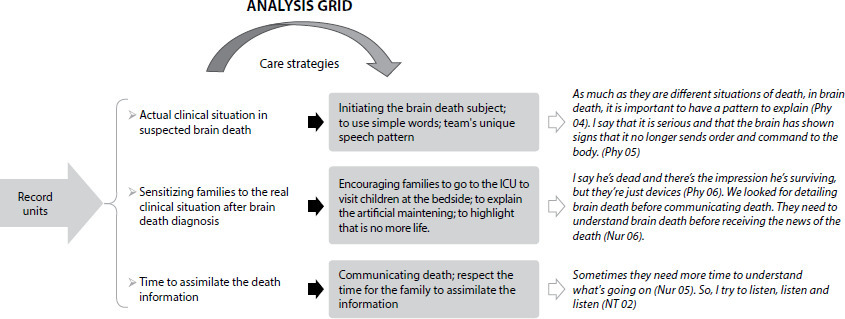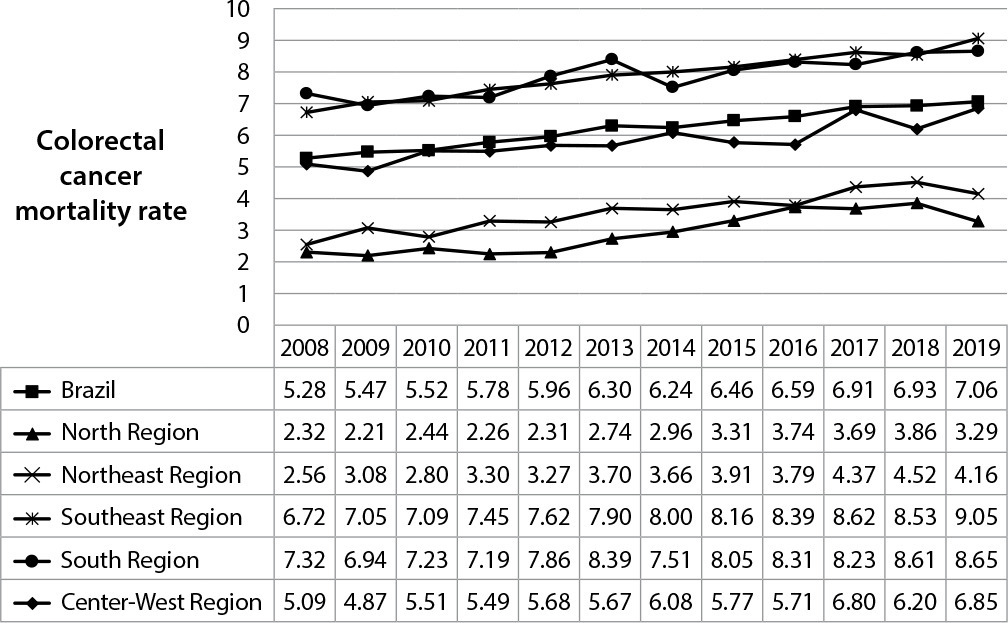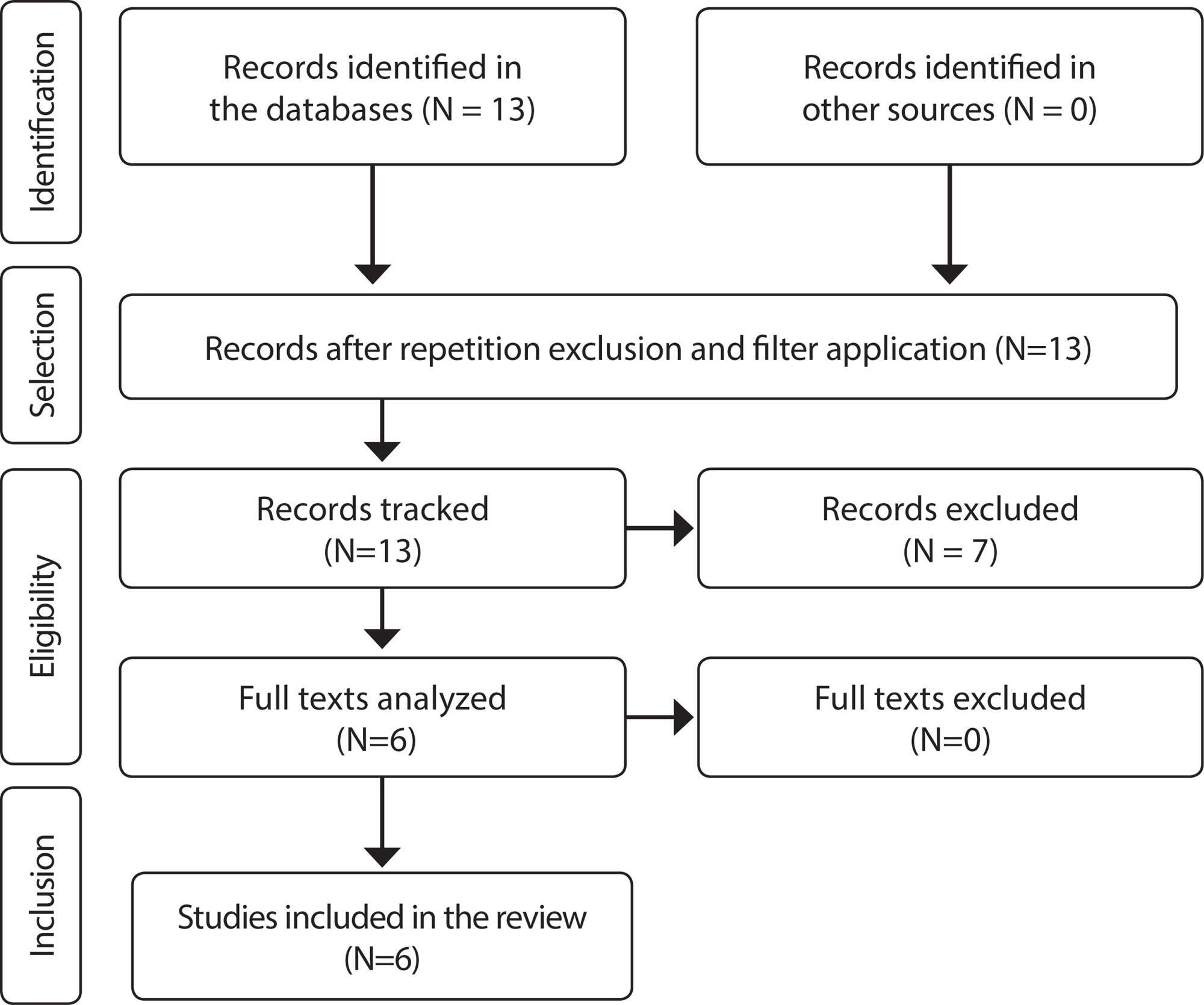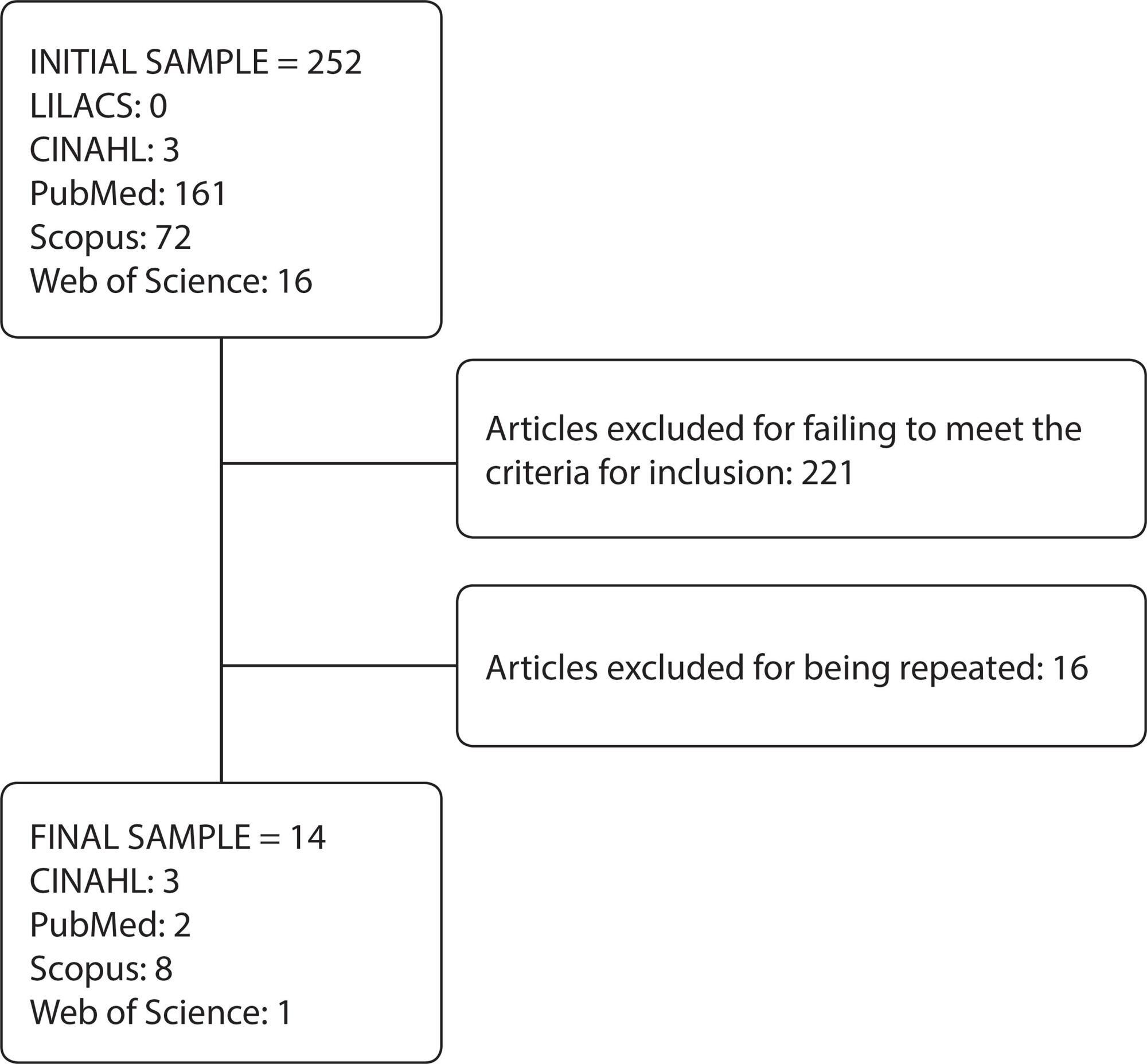-
ORIGINAL ARTICLE09-23-2022
Social entrepreneurship in the professional training in Nursing
Revista Brasileira de Enfermagem. 2022;75(3):e20220391
Abstract
ORIGINAL ARTICLESocial entrepreneurship in the professional training in Nursing
Revista Brasileira de Enfermagem. 2022;75(3):e20220391
DOI 10.1590/0034-7167-2021-0391
Views0See moreABSTRACT
Objectives:
to assess the knowledge and practices that stimulate social entrepreneurship in the professional training of Nursing students.
Methods:
qualitative exploratory-descriptive study carried out with 44 Nursing students from a University in the South Region of Brazil. Data were collected between May and August 2021, through individual online interviews. The participants were students of nursing course in the 6th semester or above, who had previously participated in teaching, research, or university outreach activities on entrepreneurship.
Results:
the data was organized and analyzed according to the thematic analysis technique and resulted in three thematic categories: Meanings of social entrepreneurship, Factors that sparked social entrepreneurship, and Recognizing oneself as an entrepreneurial nurse.
Final Considerations:
the knowledge and practices that stimulate social entrepreneurship in the professional training of Nursing students are associated with teaching, research and university outreach activities that allow concrete experiences in the living and dynamic world of communities.
-
ORIGINAL ARTICLE09-23-2022
Almanac for preventing the use of alcohol and other drugs among adolescents: construction and validity
Revista Brasileira de Enfermagem. 2022;75(3):e20220118
Abstract
ORIGINAL ARTICLEAlmanac for preventing the use of alcohol and other drugs among adolescents: construction and validity
Revista Brasileira de Enfermagem. 2022;75(3):e20220118
DOI 10.1590/0034-7167-2022-0118
Views0See moreABSTRACT
Objectives:
to build and validate an almanac to prevent the use of alcohol and other drugs among adolescents.
Methods:
a methodological study, based on the adaptation of Echer’s stages and on Culture Circles. The Content Validity Index and the Concordance Index were used for validity.
Results:
problematization in Culture Circles and literature review supported the elaboration of an almanac. In validity with eleven health judges, the material obtained a global Content Validity Index of 0.73 in the first version and 0.84 in the second version, with validation with five judges. In terms of concordance, the 95% value was obtained with four technical judges and 86.2% with nine participants from the target audience.
Conclusions:
the constructed and validated almanac has playful, dialogic and problematizing potential.

-
ORIGINAL ARTICLE09-23-2022
Brain death communication with parents of children and adolescents: care strategies
Revista Brasileira de Enfermagem. 2022;75(3):e20210943
Abstract
ORIGINAL ARTICLEBrain death communication with parents of children and adolescents: care strategies
Revista Brasileira de Enfermagem. 2022;75(3):e20210943
DOI 10.1590/0034-7167-2021-0943
Views0See moreABSTRACT
Objectives:
to identify care strategies developed by professionals from critically ill patients’ units in communicating BD with parents of children and adolescents.
Methods:
an exploratory and descriptive research with a qualitative approach, carried out in two health institutions between October and December 2019, through semi-structured interviews. Data analysis took place through content analysis.
Results:
twenty-one professionals participated. Three care strategies were identified: actual clinical situation in suspected brain death; sensitizing families to the real clinical situation after brain death diagnosis; and time to assimilate the death information.
Final Considerations:
the care strategies for communicating brain death to families identified in this study present the possibility of subsidizing health managers in training and support promotion for professionals in care practice. Moreover, they can be incorporated and validated in the care practice of the studied context.

-
ORIGINAL ARTICLE09-23-2022
Effects of multidisciplinary rounds and checklist in an Intensive Care Unit: a mixed methods study
Revista Brasileira de Enfermagem. 2022;75(3):e20210934
Abstract
ORIGINAL ARTICLEEffects of multidisciplinary rounds and checklist in an Intensive Care Unit: a mixed methods study
Revista Brasileira de Enfermagem. 2022;75(3):e20210934
DOI 10.1590/0034-7167-2021-0934
Views0See moreABSTRACT
Objectives:
to analyze the implementation of multidisciplinary checklist-directed rounds before health indicators and multidisciplinary team perception of an Intensive Care Unit.
Methods:
a mixed methods study, with an explanatory sequential design, carried out at a hospital in southern Brazil, from September 2020 to August 2021. The integration of quantitative and qualitative data was combined by connection.
Results:
after the implementation of checklist-directed rounds, there was a significant reduction in hospital stay from ventilator-associated pneumonia, urinary tract infection and daily invasive device use. The investigated practice is essential for comprehensive care, harm reduction, effective work and critical patient safety.
Conclusions:
the multidisciplinary rounds with checklist use reduced data on health indicators of critically ill patients and was considered a vital practice in the intensive care setting.
-
REFLECTION09-23-2022
Legislation and quality of nursing education in the context of the COVID-19 pandemic
Revista Brasileira de Enfermagem. 2022;75(3):e20210825
Abstract
REFLECTIONLegislation and quality of nursing education in the context of the COVID-19 pandemic
Revista Brasileira de Enfermagem. 2022;75(3):e20210825
DOI 10.1590/0034-7167-2021-0825
Views0See moreABSTRACT
Objectives:
to reflect on the governmental normative acts issued for higher education during the COVID-19 pandemic and on the repercussions of these acts on the quality of nursing education in Brazil.
Methods:
this is a reflection on the repercussions for the quality of nursing education, based on the normative acts applied to higher education, enacted from March to December 2020, available on the Ministry of Education website and in the current literature on the subject anchored in the National Curriculum Guidelines for the Undergraduate Nursing Course.
Results:
educational legislation, in the context of the pandemic, distanced education from the world of work, as well as from the quality of training established in the guidelines.
Final Considerations:
remote teaching in nursing makes it difficult to train professionals with the capacity to effectively teach and learn in the real world of care and health promotion in the Unified Health System.
-
09-19-2022
Subjetivação dos profissionais de saúde no fim da vida e morte no serviço domiciliar
Revista Brasileira de Enfermagem. 2022;75(2):e20210684
Abstract
Subjetivação dos profissionais de saúde no fim da vida e morte no serviço domiciliar
Revista Brasileira de Enfermagem. 2022;75(2):e20210684
DOI 10.1590/0034-7167-2021-0684
Views0See moreRESUMEN
Objetivos:
analizar los modos de subjetivación de los profesionales de la salud hacia el final de la vida y la muerte en un servicio de atención domiciliaria.
Métodos:
investigación cualitativa realizada en un servicio de atención domiciliaria en un hospital escuela en el sur de Brasil, con 12 profesionales de la salud. Para la recolección de datos se utilizó la observación participante y entrevistas semiestructuradas, de abril a septiembre de 2018. Los datos fueron analizados a partir del concepto de poder y subjetivación de Foucault.
Resultados:
los profesionales son sensibilizados por discursos morales, espirituales y de cuidados paliativos, así como por vivencias que los constituyen sujetos que modifican sus modos de vida y ejercicio profesional a partir de la relación con la muerte.
Consideraciones Finales:
la red discursiva de los cuidados paliativos es interiorizada por los profesionales, que realizan sus prácticas con conductas encaminadas a promover “una buena muerte”.
-
ORIGINAL ARTICLE09-19-2022
Colorectal cancer mortality in women: trend analysis in Brazil and its regions and states
Revista Brasileira de Enfermagem. 2022;75(2):e20210751
Abstract
ORIGINAL ARTICLEColorectal cancer mortality in women: trend analysis in Brazil and its regions and states
Revista Brasileira de Enfermagem. 2022;75(2):e20210751
DOI 10.1590/0034-7167-2021-0751
Views0See moreABSTRACT
Objectives:
to analyze colorectal cancer mortality trends in women in Brazil and its regions and states.
Methods:
ecological, time-series study with trend analysis of deaths caused by colorectal cancer in women in Brazil and its regions and states between 2008 and 2019. Polynomial regression was used to treat the data.
Results:
48,225 deaths of women caused by colorectal cancer were examined. There was an increasing mortality trend in Brazilian women, with regional differences that resulted from socioeconomic, political, and cultural inequalities. The South Region stood out with the highest rate (7.32) in 2008, which increased to 8.65 in 2019, followed by the Southeast Region, whose rates were 6.72 and 9.05 in 2008 and 2019, respectively.
Conclusions:
colorectal cancer mortality increased, which indicates the need to expand public policies oriented toward screening and early diagnosis of colorectal cancer in women.

-
ORIGINAL ARTICLE09-19-2022
Health professionals’ subjectivation towards end of life and death in home care service
Revista Brasileira de Enfermagem. 2022;75(2):e20210684
Abstract
ORIGINAL ARTICLEHealth professionals’ subjectivation towards end of life and death in home care service
Revista Brasileira de Enfermagem. 2022;75(2):e20210684
DOI 10.1590/0034-7167-2021-0684
Views0See moreABSTRACT
Objectives:
to analyze the modes of subjectification of health professionals towards end of life and death in a home care service.
Methods:
this is qualitative research carried out in a home care service at a teaching hospital in southern Brazil, with 12 health professionals. Participant observation and semi-structured interviews were used for data collection, from April to September 2018. Data were analyzed based on Foucault’s concept of power and subjectivation.
Results:
professionals are sensitized by moral, spiritual and palliative care discourses, as well as experiences that constitute them subjects who modify their ways of life and professional practice based on the relation with death.
Final Considerations:
the discursive network of palliative care is internalized by professionals, who carry out their practices with behaviors aimed at promoting “a good death”.
-
ORIGINAL ARTICLE03-24-2021
Development, validation and application of clinical simulation scenarios for assessment of stomatherapy specialists
Revista Brasileira de Enfermagem. 2021;74(1):e20200360
Abstract
ORIGINAL ARTICLEDevelopment, validation and application of clinical simulation scenarios for assessment of stomatherapy specialists
Revista Brasileira de Enfermagem. 2021;74(1):e20200360
DOI 10.1590/0034-7167-2020-0360
Views0See moreABSTRACT
Objectives:
to build and validate three clinical simulation scenarios and report the application with candidates for the specialist’s degree in stomatherapy.
Methods:
methodological study, building three scenarios and evaluation checklists; content validation with judges, using content validity index and Modified Kappa Coefficient; pre-test and application.
Results:
scenarios built based on nursing care for: 1. insufficiency and venous ulcer; 2. demarcation of intestinal stomia; and 3. Clean intermittent catheterization. In the content validation of the 24 items appreciated, 83%, 80%, and 92% were validated without change. In the pre-test, the objectives and checklists were adjusted. In the application, to standardize the evaluation, actors and evaluators were trained previously, and each candidate passed the three stations.
Conclusions:
scenarios built and with validated content, based on evidence and covering the three areas of stomatherapy. The pre-test allowed for adjustments in the scenarios, and the candidates achieved the expected objectives.
-
REVIEW07-10-2020
Acute Kidney Injury by SARS-CoV-2 virus in patients with COVID-19: an integrative review
Revista Brasileira de Enfermagem. 2020;73:e20200354
Abstract
REVIEWAcute Kidney Injury by SARS-CoV-2 virus in patients with COVID-19: an integrative review
Revista Brasileira de Enfermagem. 2020;73:e20200354
DOI 10.1590/0034-7167-2020-0354
Views0See moreABSTRACT
Objective:
to assess scientific evidence on SARS-CoV-2 Acute Kidney Injury in patients with COVID-19.
Methods:
an integrative review, with adoption of PICO strategy and classification of the level of evidence, carried out on April 10, 2020 in the PubMed database, of articles available between December 2019 and April 2020.
Results:
the sample consisted of six original, five observational and one experimental articles. Observational studies addressed the clinical findings of patients with COVID-19 and association between kidney damage, infection, and morbidity-mortality.
Conclusion:
the studies addressed the mechanism of intracellular infection of SARS-CoV-2, its cytopathic effects on kidney cells and incidence of acute kidney injury in patients infected with SARS-CoV-2. Acute kidney injury is associated with increased mortality and morbidity in these patients. This review realizes the need for new research that can mention kidney care to patients with COVID-19.

-
ORIGINAL ARTICLE12-05-2019
Factors associated with metabolic syndrome in older adults: a population-based study
Revista Brasileira de Enfermagem. 2019;72:221-228
Abstract
ORIGINAL ARTICLEFactors associated with metabolic syndrome in older adults: a population-based study
Revista Brasileira de Enfermagem. 2019;72:221-228
DOI 10.1590/0034-7167-2018-0620
Views0See moreABSTRACT
Objective:
To estimate the prevalence of the metabolic syndrome and clusters of its components and to identify possible associated factors in older adults.
Method:
Cross-sectional and population-based study, involving 271 older people. We collected sociodemographic, behavioral, clinical, biochemical, and anthropometric data. Data were analyzed by descriptive and logistic regression techniques.
Results:
The prevalence of metabolic syndrome was 59% and was associated with women, overweight/obesity, and the C-reactive protein. Concerning the clusters, 11.4% of the sample had all the components of the metabolic syndrome, and only 5.2% of individuals did not have any of its components.
Conclusion:
We found there is a high prevalence of metabolic syndrome and clusters of its components in older adults. It is important to deepen studies on this matter, considering clinical aspects in relation to sex and healthy behavioral habits for creating public policies as well as emphasizing actions aimed at promoting self-care in all cycles of life.

-
08-19-2019
Institutional strategies to prevent violence in nursing work: an integrative review
Revista Brasileira de Enfermagem. 2019;72(4):1052-1060
Abstract
Institutional strategies to prevent violence in nursing work: an integrative review
Revista Brasileira de Enfermagem. 2019;72(4):1052-1060
DOI 10.1590/0034-7167-2018-0687
Views0See moreABSTRACT
Objective:
To analyze the production of research that adopted as object of investigation: institutional strategies, actions and programs to curb and/or prevent the nursing workplace violence.
Method:
Integrative review of 14 articles in full, available in the databases LILACS, PubMed Central, Scopus, CINAHL and Web of Science.
Results:
Of the articles analyzed, most arise from quantitative research (71%), carried out in the United States (65%), with educational actions (57%) and programs (43%), denoting policies.
Conclusion:
Results showed various ways to curb or prevent nursing workplace violence. These are specific strategies, there are few programs deployed worldwide, usually centered in the United States, Canada and Sweden. Most of them is well evaluated and can serve as a model for the development and dissemination of policies according to the needs of each location.

-
08-19-2019
Professional education on dementias in Primary Health Care: an integrative review
Revista Brasileira de Enfermagem. 2019;72(4):1086-1093
Abstract
Professional education on dementias in Primary Health Care: an integrative review
Revista Brasileira de Enfermagem. 2019;72(4):1086-1093
DOI 10.1590/0034-7167-2018-0652
Views0See moreABSTRACT
Objective:
To investigate the most commonly used educational approaches in dementia training for primary health care professionals.
Method:
Integrative literature review, conducted between April and June of 2018, in PubMed, LILACS and IBECS databases. The descriptors used were: Training, Health Personnel, Dementia, Primary Health Care for PubMed; and the MeSH terms, Training Programs, Health Personnel, Dementia, and Primary Health Care for LILACS and IBECS.
Results:
The sample consisted of 13 articles; eight were published in the last five years (62%); seven articles with a quantitative approach (54%); seven articles produced on the European continent (54%), followed by five published on the North American continent (38%). All journals were from the health area (100%).
Conclusion:
Educational strategies were combined and used for education. Significant improvements in knowledge, skills, and attitudes of the teams with regard to professional management of dementias were evidenced.

-
05-21-2021
Quality of life and falls in elderly people: a mixed methods study
Revista Brasileira de Enfermagem. 2021;74:e20200400
Abstract
Quality of life and falls in elderly people: a mixed methods study
Revista Brasileira de Enfermagem. 2021;74:e20200400
DOI 10.1590/0034-7167-2020-0400
Views0See moreABSTRACT
Objective:
to assess elderly people’s quality of life, understanding the social representations of falls.
Methods:
a convergent mixed methods research carried out at homes, with a sample of 134 elderly people. A structured questionnaire was used, covering sociodemographic variables and factors that indicated frailty and risk of falling. For quality of life assessment, Medical Outcomes Study Short-Form 36 and Theory of Social Representations, Abric’s structural approach were used, with data treated by dictionary of equivalent terms, processed in Evoc 2000, converging analytically according to Neuman.
Results:
quality of life impairment was identified in terms of physical, emotional and functional capacity. The elements of the possible central nucleus were fall, fear, and bruised-broken-bone.
Final considerations:
quality of life impairment can contribute to increase the number of falls, which has been shown to be an event present in elderly people’s lives through evocations. Understanding elderly people’s individual demands allows planning actions.

-
ORIGINAL ARTICLE02-10-2020
Common mental disorders in nursing students of the professionalizing cycle
Revista Brasileira de Enfermagem. 2020;73(1):e20180154
Abstract
ORIGINAL ARTICLECommon mental disorders in nursing students of the professionalizing cycle
Revista Brasileira de Enfermagem. 2020;73(1):e20180154
DOI 10.1590/0034-7167-2018-0154
Views0See moreABSTRACT
Objectives:
to verify the suspicion of common mental disorders in nursing students of the professionalizing cycle and the association with sociodemographic features.
Method:
cross-sectional study with a sample of 85 students from a public university in the state of Rio de Janeiro (RJ) who responded to the Self-Report Questionnaire-20 and sociodemographic questions.
Results:
the suspicion prevalence of common mental disorders (CMD) in the sample was 55.3% and it was identified the association with the consumption of alcohol. Of the most frequent SRQ-20 complaints, 95.3% reported “feeling nervous, tense or worried”, 72.9% “having difficulty making decisions”, 60% “sleeping poorly” and 37.6% “having lost interest by things “.
Conclusion:
high prevalence of CMD in the sample and the association with the consumption of alcohol requires preventive and therapeutic actions among the students that minimize the possibility of severe mental disorders related to the consumption of alcohol and other drugs.
-
REVIEW07-13-2020
Prevention and control measures for neonatal COVID-19 infection: a scoping review
Revista Brasileira de Enfermagem. 2020;73:e20200467
Abstract
REVIEWPrevention and control measures for neonatal COVID-19 infection: a scoping review
Revista Brasileira de Enfermagem. 2020;73:e20200467
DOI 10.1590/0034-7167-2020-0467
Views0See moreABSTRACT
Objective:
to identify with the literature the measures to prevent and control neonatal infection by COVID-19.
Methods:
a scope review carried out by searching for studies in databases and institutional health websites. The final sample was 25 articles.
Results:
among the main measures are the use of masks by suspected or infected people in contact with healthy newborns, hand hygiene before and after each care and feeding as well as the tools used for milking. It is indispensable to use personal protective equipment by health professionals in neonatology services to maintain a private room for infected newborns or to use physical barriers. Early diagnosis and timely case management is essential to reduce virus transmissibility.
Conclusions:
the research contributed to elucidate health and nursing actions in preventing and controlling neonatal infection by COVID-19.

Search
Search in:
Nuvem de Tags
Adolescente (85) Atenção Primária à Saúde (239) COVID-19 (91) Criança (91) Cuidados de Enfermagem (269) Educação em Enfermagem (151) Educação em Saúde (139) Enfermagem (930) Enfermagem Pediátrica (86) Estudantes de Enfermagem (77) Estudos de Validação (131) Família (87) Idoso (208) Promoção da Saúde (99) Qualidade de Vida (104) Saúde do Trabalhador (86) Saúde Mental (145) Saúde Pública (82) Segurança do Paciente (150) Tecnologia Educacional (100)



